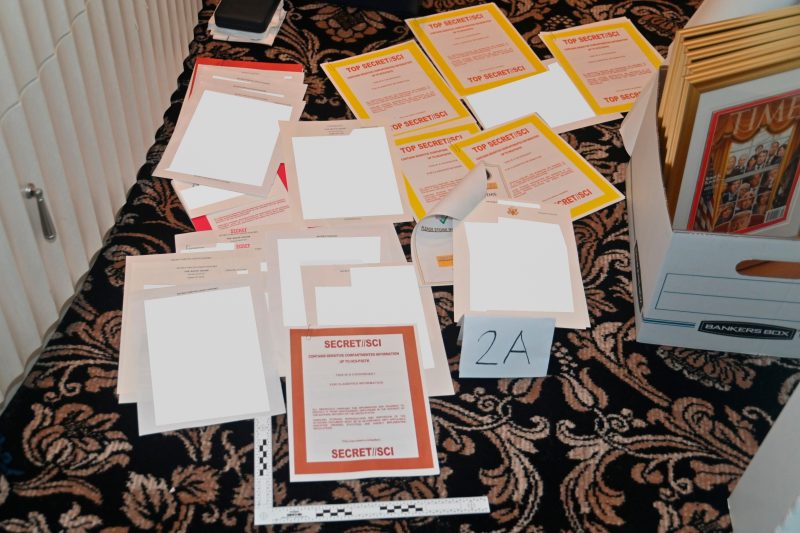
Trump’s classified documents case schedule may be delayed, Judge Cannon says

FORT PIERCE, Fla. — The judge overseeing Donald Trump’s indictment for allegedly mishandling national security secrets suggested Wednesday that she might push back the planned trial timeline, as courts wrestle with the growing complexity of juggling four separate criminal cases and an ongoing civil trial against the former president.
U.S. District Judge Aileen M. Cannon listened to prosecutors argue at a hearing for keeping the schedule she set earlier this year, which includes a trial in May 2024. Lawyers for the former president insisted they needed more time to prepare.
“I’m having a hard time seeing how this work can be accomplished in this compressed time frame,” Cannon said at one point, focusing in particular on a federal trial scheduled to begin March 4 in Washington in which Trump is accused of conspiring to obstruct the results of the 2020 election.
Wednesday’s debate largely centered on looming deadlines for Trump’s lawyers to file pretrial motions in the Florida case. But pushing back that time frame could have a domino effect of delaying the entire trial schedule.
Prosecutor Jay Bratt argued that whatever the deadlines may be in other cases, those could all change, so it did not make sense to alter the trial date in the Florida case. Cannon sounded skeptical.
“I’m not quite seeing in your position an understanding of these realities,” Cannon told Bratt. The judge said she would rule on the schedule “as soon as possible.”
The hearing highlighted the complexities of a case that centers on highly classified documents, involving a defendant who has multiple competing court dates up and down the East Coast — even as he again runs for president.
Trump lawyer Todd Blanche spent close to an hour telling the judge how “voluminous” the evidence in the classified documents case is, and emphasizing that he and Trump’s other lawyers need more time to review it. He also noted that the D.C. indictment — also brought by Justice Department special counsel Jack Smith — came after Trump was first charged in the classified-documents case. The Florida trial date was set by Cannon before Trump was indicted in Washington.
“Everything has changed” since Cannon first set the trial date, Blanche told the judge. “There is not a single part of your honor’s schedule that is not adversely affected by the D.C. case.”
Trump is charged in Florida with dozens of counts of mishandling classified information and plotting with two aides to obstruct government efforts to recover hundreds of classified documents at Mar-a-Lago, his Palm Beach home and private club, after his presidency ended. He has pleaded not guilty.
Wednesday’s hearing also featured a lengthy back-and-forth over how long it should take the defense lawyers to review security camera footage from Mar-a-Lago, which authorities have said shows Trump aides moving dozens of boxes of documents in an effort to prevent federal authorities from learning about the sensitive papers.
Defense lawyers say they have to review many, many hours of footage, while prosecutors say they have already pointed Trump’s team to the relevant days and hours.
Trump investigations
End of carousel
Much of the legal jousting so far in the documents case has centered on disputes over how soon Trump should go on trial. The Justice Department had initially requested that the Florida trial begin in December — far earlier than Trump’s bid to hold it after the 2024 presidential election.
At Wednesday’s hearing, Trump’s lawyers said one key member of his legal team, Christopher Kise, has yet to review the classified documents or talk to his co-counsel about their contents. That’s because Kise is busy representing Trump at a civil trial in New York City over alleged fraud in the valuation of Trump’s business assets — a trial that could last well into next month.
Illustrating the point, Kise called in to the hearing from New York, where Trump’s son, Donald Trump Jr., was called to testify in the afternoon.
Prosecutors say Trump and his lawyers have had ample time to review the materials and have overstated the logistical difficulties of doing so. Prosecutors say there had been a small number of classified materials so sensitive that Trump initially could review them only in Washington, D.C., because a secure-enough facility was not yet ready in Florida. But they said that all the classified materials are now available to review in Florida.
In addition to the civil trial and the two federal criminal cases, Trump also faces two state-level indictments — creating a maze of potential court dates and election primaries that could make the 2024 presidential race unlike any other in the country’s history.
His federal trial in D.C. is scheduled to start March 4, just one day before Super Tuesday, the day more than a dozen states select a GOP nominee.
Trump is also slated to go on trial in New York court later in March, on state charges of business fraud related to hush money payments made in 2016.
The former president also has been indicted in Fulton County, Ga., by the local district attorney. That case, which has yet to get a trial date, charges that the president was part of a sprawling conspiracy to block the state’s results in the 2020 presidential election.
Trump has pleaded not guilty in all the criminal cases.
